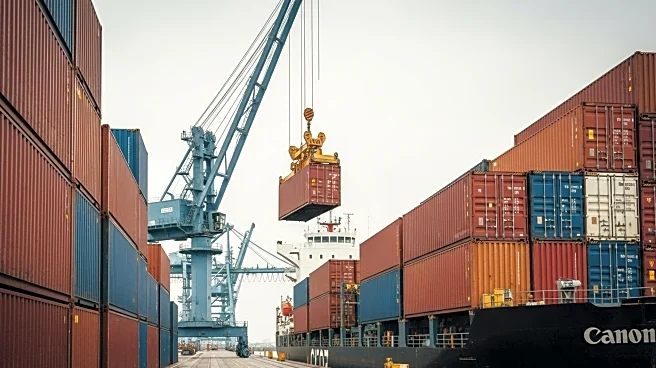What is the story about?
What's Happening?
The latest Global Port Tracker report, released by the National Retail Federation and Hackett Associates, indicates a decline in U.S.-bound imports for the remainder of the year. This trend is attributed to the stocking of holiday merchandise and the effects of tariffs imposed by the White House. The report covers major U.S. ports, including Los Angeles/Long Beach, New York/New Jersey, and others. It notes that while cargo import numbers do not directly correlate with retail sales, they provide a rough barometer of retailers' expectations. Recent tariffs include a 25% levy on upholstered furniture and kitchen cabinets, with further increases planned. Despite these challenges, retailers have frontloaded imports to mitigate tariff impacts, resulting in a peak season that has already passed.
Why It's Important?
The decline in import volumes has significant implications for U.S. retailers and consumers. As tariffs increase costs, retailers may struggle to shield customers from price hikes, potentially affecting consumer spending and economic growth. Large importers have managed to absorb some costs, but smaller businesses may face difficulties. The report suggests that as inventories deplete, the inflationary impact of tariffs will become more apparent, potentially leading to higher prices for goods. This situation underscores the broader economic uncertainty caused by U.S. tariff and immigration policies, which could lead to unpredictable shifts in trade volumes.
What's Next?
The report anticipates continued volatility in trade volumes over the next four to six months, influenced by tariff policies and economic conditions. While some tariffs may remain, the steepest increases might not materialize. Retailers and importers will need to navigate these challenges, potentially adjusting their strategies to manage costs and maintain supply chains. The situation may prompt further discussions on trade policy and its impact on the economy, with stakeholders closely monitoring developments.
Beyond the Headlines
The ongoing tariff situation raises ethical and economic questions about the balance between protecting domestic industries and maintaining affordable consumer goods. The impact on smaller importers highlights disparities in the ability to absorb increased costs, potentially leading to market consolidation. Long-term shifts in trade policy could influence global supply chains and U.S. economic competitiveness, prompting debates on the future direction of trade relations.
















